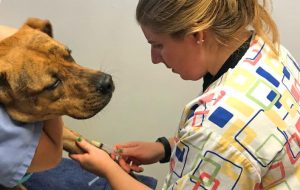- Slug: BC-CNS TGen Tests Pets for COVID, 605 words.
- 2 photos and captions below.
By Emma Richburg
Cronkite News
PHOENIX – The Translational Genomics Research Institute has launched a new project with the Arizona Department of Health Services to better understand how COVID-19 affects pets.
There is no critical evidence to suggest pets can transmit the virus to humans, but pets can transmit the virus to other animals. So far, more than 120 pets have tested positive for COVID-19 nationwide, according to representatives of TGen, a nonprofit medical research institute with divisions in Phoenix and Flagstaff.
Taylor Harris, 19, of Chandler, saw this firsthand in September when her cat, Sid Vicious, was diagnosed with the disease. Although pet testing was not readily available to certify the diagnosis, her veterinarian said the cat’s symptoms aligned with that of COVID-19 and treated Sid accordingly.
Harris’s mother, who lives with her and the cat, had contracted COVID-19 shortly before Sid showed his initial symptoms.
“My cat is normally really energetic and always wants to be outside and play. And he was just laying around,” Harris recalled. “He was barely moving, he wasn’t eating anything, and when he would move, he would be coughing and wheezing. His coughing was getting so bad that he couldn’t breathe.”
Harris hand-fed Sid for weeks because he was too weak to walk to the bowl. He took a month to recover fully.
“I wish there was appropriate testing at that point for cats and dogs and house pets because we were just really unsure about what to do,” Harris said. “We were like, ‘Oh, our cat has COVID and COVID is killing this many people, so how is he, a cat, going to react to something like that? Is it lethal for animals?’
“There weren’t any studies yet about it, so there was a lot of anxiety and being unsure.”
TGen hopes to answer some of those questions. Hayley Yaglom, a genomic epidemiologist and lead TGen investigator on the study, said TGen is looking to enroll about 100 dogs and cats across Arizona that are living in households with individuals who have tested positive for COVID-19 within the past two weeks. Trained veterinary staff then will visit the home to collect nasal, fecal and blood samples from the pets.
“A project like this can leverage those to help us learn more about COVID and animals,” Yaglom said. “We want to do this project to be able to support the pet-owner community and the veterinary community and to learn more about what could be happening in our state with all of these new strains.”
The new project will also build on One Health, a disease surveillance partnership in Arizona that encourages a collaborative effort among local, national and global organizations. “One health” reflects the idea that the health of humans, animals and the environment are interconnected.
David Engelthaler, who leads TGen’s infectious disease studies, said the animal study will help to answer several questions by analyzing different pets.
“Were they exposed?” Engelthaler asked. “Did they develop some antibodies? Do they still have the virus? And then to what degree is it? Is it a large scale infection causing the symptoms, or is it transiently carrying the virus?”
The Arizona Department of Health Services awarded a $50,000 grant from the U.S. Centers for Disease Control and Prevention and the Council of State and Territorial Epidemiologists to the study.
The tests are free. Owners must be at least 18, provide consent and fill out a questionnaire. The pet must be vaccinated against rabies, mainly housed indoors and tolerant of routine veterinary care.
For more information about testing pet dogs or cats for COVID-19, please send questions to: covidpetprojectaz@tgen.org.
For more stories from Cronkite News, visit cronkitenews.azpbs.org.
^__=

